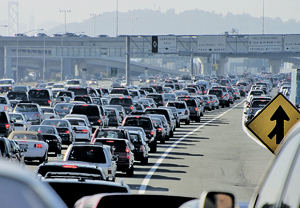Advertisement
Grab your lab coat. Let's get started
Welcome!
Welcome!
Create an account below to get 6 C&EN articles per month, receive newsletters and more - all free.
It seems this is your first time logging in online. Please enter the following information to continue.
As an ACS member you automatically get access to this site. All we need is few more details to create your reading experience.
Not you? Sign in with a different account.
Not you? Sign in with a different account.
ERROR 1
ERROR 1
ERROR 2
ERROR 2
ERROR 2
ERROR 2
ERROR 2
Password and Confirm password must match.
If you have an ACS member number, please enter it here so we can link this account to your membership. (optional)
ERROR 2
ACS values your privacy. By submitting your information, you are gaining access to C&EN and subscribing to our weekly newsletter. We use the information you provide to make your reading experience better, and we will never sell your data to third party members.
Policy
Tailpipe Emissions Fight
California to sue Administration for rebuffing plan to limit greenhouse gases from cars
by Cheryl Hogue
December 24, 2007
| A version of this story appeared in
Volume 85, Issue 52

THE BUSH ADMINISTRATION faces what is likely to be an uphill legal battle following its rejection last week of California's plan to regulate greenhouse gas emissions from new cars and trucks.
"There is absolutely no legal justification for the Bush Administration to deny this request," says California Attorney General Edmund G. (Jerry) Brown Jr. Brown will take the issue—backed by as many as 17 other states—to federal court as soon as legally possible.
After delaying the decision for two years, EPA announced its rejection of California's plan on Dec. 19, just hours after President George W. Bush signed new energy legislation into law. That law requires new vehicles to meet a 35 mpg average fuel economy by 2020.
EPA Administrator Stephen L. Johnson says the agency denied California's request because the new statute creates a "national solution" to reduce greenhouse gas emissions from cars and trucks.
Federal courts have repeatedly rejected the argument that fuel economy standards preclude regulation of greenhouse gas emissions from vehicles, says James D. Marston, director of state climate initiatives for Environmental Defense. The Transportation Department sets fuel economy standards, while air pollution from vehicle tailpipes is controlled under the Clean Air Act. Federal courts have ruled that while there is overlap between these two types of regulations, one does not trump the other, Marston tells C&EN.
In denying the request, EPA said California did not face "compelling and extraordinary" conditions that require tailpipe emission controls that are stricter than federal ones.
"It is completely absurd to assert that California does not have a compelling need to fight global warming by curbing greenhouse gas emissions from cars," Brown says.
Automakers lobbied hard against the California plan.
Seventeen other states are poised to adopt the California vehicle standards—Arizona, Colorado, Connecticut, Florida, Iowa, Maine, Maryland, Massachusetts, New Jersey, New Mexico, New York, Oregon, Pennsylvania, Rhode Island, Utah, Vermont, and Washington. With California, these states account for nearly half of all new vehicles sold in the U.S.






Join the conversation
Contact the reporter
Submit a Letter to the Editor for publication
Engage with us on Twitter